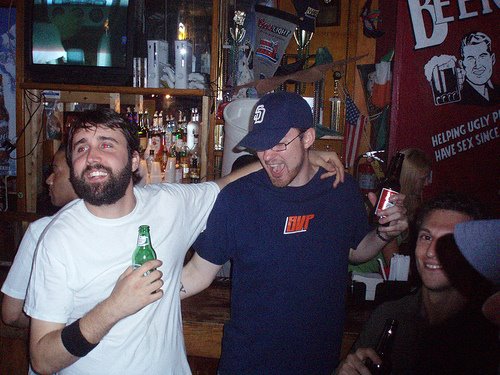
The movement of Josh Beckett from disappointing headcase (Media's take) to All-Star caliber pitcher (actuality all along) is in motion. The reasoning has been well-documented-- his penchant for hotheadedness was a force behind his fastball and it's failure-- but psychology had only one part in Beckett's sudden rise. Alongside coaching changes and an understanding of his surroundings, Beckett's 7-0 record has more to do with function than it does mindset.
The function of a pitcher is no longer to be the star of a baseball game. Since the advent of sporting television and the highlight, the throngs of sports fans have lauded their attention on offensive output: the home run, RBI, etc. The mindset of a team, however is split in half. Nowadays, the Ted Lilly's can demand top-dollar while the Alex Gonzales' (more important due to everyday play) are scrounging for tips from teams needing to plug holes. Beckett's superiority was dormant (labeled "potential")-- especially since his domination of the 2001 playoffs. Yet, the Red Sox said that they got a proven young winner, not a prospect.
That Beckett has proven them right in a young season is not surprising. As many times as being lauded for his "stuff," he has been criticized for being bullish. His penchant for fastballs in frustrating counts was noted on practically every blog and media site in the world of Red Sox baseball. However, this bullishness is exactly why he has relied on pithing off-speed this year. He's proving that he can out-pitch anyone that has traded his pigheaded idea of being the brand-name fireballer to being a Cy Young candidate. You could see it late last year. The frustration of trying to show everyone up who was complaining about his fastball has now turned to shutting everyone up about his value over two prospects.

Why the bullishness? It's simple: Bonds' need to be the best wound up getting him the spotlight for steroids and record chases, Clemens' need keeps him continually coming back, Schilling's need makes him baseball's player-politician. Those who will not stray from the spotlight find ways to bring it to them. Beckett realized that being a jerk in a jerk town just leads to frustration (Pedro learned this as well and though Schilling refuses to learn, that's what a politician does, right?). Beckett learned that simply being the best pitcher in a major market will garner you the attention you desire. Pitchers may not be the most watched superstars, but they are the most coveted.
I call it the Cowperwood Corollary. Dreiser's trilogy of a rich man shows a character motivated not only by avarice, but the attention it garners. Cowperwood wants to be rich and powerful, but refuses to be a politician to do it. Beckett wants to be considered the ace of a staff predicated on people vying to be the ace. It's a position that since the Pedro-Schill years that has become impossible to care about unless you are a fan of the Sox. Wells, Pedro, Schill, Beckett, and Daisuke all vied (or continue to vie) for the glorious position of being lauded as the best since Clemens in the early 90's. Attention and adoration, to be sure, are motivating factors before athletic dominance.
His 7-0 start is a simple case of function over form. To be considered the best, you have to be the best. To do that, you have to fool the best hitting and most overpaid division in the league. Fastballs weren't cutting it, so Beckett changed form. To gain attention as a pitcher, you either have to be a prima donna (Pedro, Clemens) or a loudmouth (Wells, Schilling) to try and outshine the sluggers (Bonds, Ortiz--albeit in opposite sides of the spectrum, so to speak) and be the bulldog at the forefront of the pack.
You also, more than anything else, have to sacrifice to win and be noticed. Schilling was willing to sacrifice his credibility in certain circles be a mouthpiece, Bonds was willing to sacrifice his name for famous records, Pedro was willing to kill his shoulder for wins. All Beckett needed to do was refine his talent. I don't know if he is now fully realized as far as potential is concerned, but at least the struggle has shifted. The need for recognition is going to become quelled, as long as the wins keep coming. If not, the next form will come. The fans are satisfied with wins, but will Beckett be as much? If the Cowperwood Corollary is right, then no. I hope I'm am wrong, of course. All-star caliber is something worth watching, but not at the expense of feigned star power-- just ask anyone following the news of Clemens, Schilling or Bonds as of late.





No comments:
Post a Comment